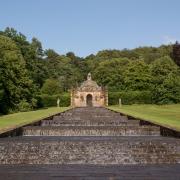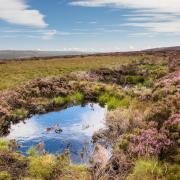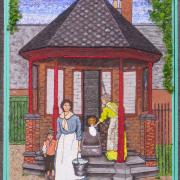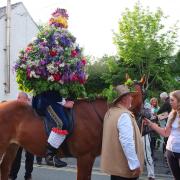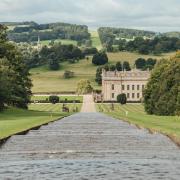Moving through the centre of Clay Cross and down a discreet narrow lane, leading to the more rural areas of the town, Kenning Park comes into view, the entrance for a locally-run forest school.
Post-Covid, the demand on forest school services has increased significantly, according to The Forest School Association’s survey of their 200+ forest schools around the country.
The concept of children – and adults for that matter – becoming more engaged in nature came more firmly into focus after the country spent considerable periods of time in lockdown, leading to the realisation for many that nature still had a lot to teach us.
It’s a view firmly held by Kenning Park Community Forest School founder and leader Michaela Garner.
‘I think that during the pandemic families realised just how beneficial being outdoors is to their physical and mental wellbeing,’ says Michaela. ‘There has been a notable rise in the forest school’s attendance since that period.’
The origins of forest schooling have, perhaps, also played their part in Kenning Park Community Forest School’s desire for improved holistic balance in life.

In fact, the school’s premise is based on the ‘Scandinavian philosophy of friluftsliv or open air living’ with the focus being on child-led learning and hands-on experience, which is reflected in the sessions instructed by Michaela.
The growing non-profit organisation is, says Michaela, dedicated to bringing the benefits of forest school and bushcraft skills to local families and community groups.
Michaela’s passion and care for the community and nature is evident within moments of being in her company; a feeling which is only fostered in the forest school sessions.
Towards the end of the pandemic, Michaela approached the Kenning Park Community Group which manages Kenning Park for the Clay Cross Parish Council who, in turn, offered her the space to run the school.
It’s a move that’s appreciated by Michaela. ‘The parish council have been massively supportive since we moved to the park,’ she says. ‘This includes fundraising for the school and promoting our sessions in the community.’
‘Ultimately, our aim is to support the community by providing educational opportunities while simultaneously bringing people together, promoting better mental health and connection to nature.’

Here, there is a campfire, coffee and tea available in reusable flasks, and a fire which heats the hot chocolate and marshmallows.
On the occasion of my visit, ‘The Little Bugs’ toddler session is currently taking place. There are various activities dotted around: a mud kitchen with many pots, pans and utensils; a large cloth canvas that is tied between two trees for children to paint freely; and various spaces that encourage imaginative and creative play.
It is easy to see why these sessions are so popular among the Clay Cross community all year round, attended, notes Michaela, by childminders, parents, grandparents and home educators.
At the time of writing, Michaela is currently constructing the forest school summer holiday sessions – a busy yet exciting time.
‘We often have a guest organisation working alongside the forest school and offer free nature-based crafts, fireside lunches and free play equipment such as hammocks, mud kitchens, slacklines and a water wall,’ she reveals.

While it would be a natural assumption to believe it to be the case, the forest school is not only for children.
‘The adult sessions were set up as part of green-prescribing and is currently being funded through 2024 with the assistance of the Severn Trent grant scheme,’ explains Michaela.
‘The aim of these sessions is to bring adults in the local community together, to get them outdoors and help with their mental health and wellbeing. Sessions will also include an optional craft or skill-based activity for those who are interested.’
In July of this year, the school offered a free outdoor sound bath that was open to everyone, as well as the continuous sessions which are run with the aim of bringing together the local community.
‘Hobby-Talk are a men's mental health group from Chesterfield who regularly have sessions with us and do amazing work combating isolation and supporting mental health,’ reveals Michaela.
‘Our Connected by Nature adult sessions run weekly and we are also currently part of the Rykneld Homes Duke of Edinburgh Bronze Award, providing free access to the scheme for local children.’
After attending the forest school in Clay Cross, I was left with a feeling of not just incredible admiration for Michaela, but also the great sense of community which exists here.
I witnessed such a welcoming and warm environment, with children and adults supporting each other and truly enjoying exploring their surroundings together.
It is also clearly apparent that instructor Michaela thrives in this environment.
‘Bringing people together in the outdoors is such a rewarding experience,’ she says with a smile.
‘I absolutely love seeing the joy and sense of accomplishment when someone masters a new skill such as fire from spark, making their own basket or even something as simple as learning a new knot.’
The focus on the local community undoubtedly drives the group. Even in the toddler sessions, children were working together to create art, or simply play.
That connection to their environment and each other is, suggests Michaela, essential and reciprocated by the community as a whole.
‘The community have been entirely welcoming of the school in many ways,’ she says. ‘This ranges from dog walkers keeping an eye on the site to donations of craft materials.’
The forest school has not only impacted people, but the local landscape too.

‘Our groups take nature to heart,’ reveals Michaela. ‘People here have learned forgotten skills using natural materials or have been educated on the environment around them - wild foods that can be foraged, our natural habits and the animals that live in or around the park. We’re now starting to see the benefits of this in Kenning Park.’
Forest schooling can be expensive and, given the financial pressures many families are facing, Michaela has strived to create Kenning Park Community Forest School at as little cost to parents and carers as possible.
This includes being part of the Feeding Derbyshire network, established to help those with low incomes, debt and poor access to affordable, nutritious food.
As such, all of the Kenning Park Community Forest School groups offer a free or at cost meal for everyone who attends.
Equally, providing that safe space for all is a firm priority for Michaela.
‘We work closely with families attending our sessions to make sure we are as accessible as we can possibly be,’ she concludes.
‘This can mean anything from providing quiet spaces for children and adults with additional needs to fitting sessions around a group's personal interests.’
For those looking for a welcoming community in a beautiful location, where the fast-paced nature of life slows to reveal the importance of care, respect, and fun; then Kenning Park Community Forest School is certainly a place to go.










